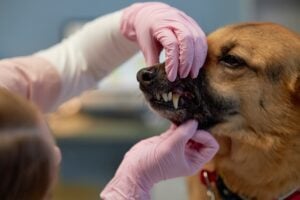6 Chew Toys Vets Warn Could Harm Your Dog’s Teeth
Table of Contents
Most dog owners know that chewing helps relieve stress, fight boredom, and keep their pet’s teeth strong. But not every chew toy is as safe as it seems. In fact, some of the most popular options on store shelves can actually harm your dog’s teeth, leading to painful fractures, gum injuries, or costly dental work. Here are seven common items you’ll want to think twice about giving your pup.
1. Why Bones Aren’t a Safe Chew
- Many pet owners assume meat bones are a natural and healthy chew toy, but in reality, they can be one of the most dangerous choices. When a dog chews on something as hard as a bone, they risk cracking or fracturing their teeth. Dogs often get so focused on stripping every bit of meat or marrow that they don’t notice the damage happening in their mouth. Once the bone is gone and the toothache sets in, your pup may suffer in silence without showing clear signs of pain.
Even so-called fresh butcher bones aren’t safe. All bones, raw, cooked, or ring-shaped, can cause serious dental and digestive issues. Ring bones may trap a dog’s lower jaw and require removal under anesthesia. Broken pieces of bone can be swallowed and lead to intestinal blockages, while poultry bones splinter easily and can puncture the stomach or intestines. For your dog’s safety, bones should never be on the menu.
2. Antlers
- Deer antlers have become a trendy chew sold in pet stores as a “natural alternative” to bones, but they’re no safer. Antlers are made of material just as tough as bone, after all. They’re meant to help deer defend themselves in fights. Their durability makes them a hazard for dogs, especially when determined chewers grind away at the outer surface.
Inside, antlers have a softer core that dogs love to reach. But to get there, they must chew through the rock-hard exterior, often fracturing teeth in the process. Small, broken pieces can also be swallowed, creating a risk for digestive problems. While they might look appealing, antlers are far too hard to be a safe option for your pup’s dental health.
3. The Hidden Risk of Tennis Balls
- Fetch with a tennis ball is a classic dog game, but problems start when your pet decides the ball is more fun to chew than to chase. The fuzzy felt covering acts like sandpaper against the teeth. Over time, this constant rubbing can wear down enamel, weakening teeth and causing painful sensitivity.
The issue gets worse because the fuzz easily picks up dirt and grit, making it even more abrasive. Enamel erosion occurs slowly, so most owners don’t realize the damage until their dog has already developed significant dental wear. For playtime, it’s fine to toss the tennis ball, but take it away when the game is over to protect your dog’s teeth.
4. Cow Hooves
Cow hooves are another product marketed as a natural chew, but their toughness makes them dangerous. Hooves are made from keratin, the same hard protein that strengthens nails and horns, and are nearly indestructible. While that durability might sound like a good thing, it means your dog’s teeth take the damage instead.
Chewing on hooves can cause painful fractures, chips, or cracks. In addition, hooves can splinter while being chewed, creating sharp edges that cut your dog’s gums, tongue, or even puncture the stomach or intestines if swallowed. Despite their popularity, cow hooves carry far more risks than benefits
5. Ice Cubes and Dental Damage
- On a hot day, dropping an ice cube into your dog’s bowl may seem like a fun, refreshing treat. But when dogs chew directly on ice cubes, they’re essentially chomping on rock-hard frozen water, which can easily break a tooth.
What seems like harmless fun can result in an emergency dental visit and even tooth extraction. That doesn’t mean ice water is off limits. You can safely cool your dog’s drink by adding a cube or two. Just be sure your pup doesn’t fish them out to chew.
6. Sticks
Most backyards are full of sticks, and many dogs naturally pick them up while playing outside. Unfortunately, sticks are far from safe. Small ones can lodge between the teeth or get stuck on the roof of the mouth, leading to injuries to the gums and palate. Larger sticks can splinter as they’re chewed, leaving behind sharp shards that injure the mouth or pierce the digestive tract if swallowed.
While sticks may seem like an easy fetch toy, they come with serious risks. A safer choice is a pet-safe rubber ball or other vet-approved toy designed for chewing and chasing.
Nylon Chew Toys
- Nylon bones and similar synthetic chews are widely marketed as safe alternatives to natural chews, but many of them are too hard for a dog’s teeth. Some nylon toys don’t give way when bitten, which means they can fracture teeth just like bones or antlers.
If you want to use nylon chews, the key is to check hardness. A good rule of thumb: if you can’t press your thumbnail into the material and make an indentation, it’s too hard for your dog. Choose products that are durable but with some “give,” so your pet can chew safely without risking dental injuries.
Picking the Right Chew Toys for Your Dog’s Dental Safety
- With so many chew toys on the market, it can be hard to know which ones are safe for your dog. Unfortunately, many popular options can damage teeth more than they help. The good news?
You don’t have to avoid chew toys altogether. By following a few smart guidelines, you can pick toys that satisfy your dog’s need to chew while keeping their teeth protected.
Go Soft, Not Rock-Hard
- The most important rule of thumb is this: if it’s too hard for your fingernail to dent, it’s too hard for your dog’s teeth. Hard materials like antlers, bones, or rigid nylon can lead to painful tooth fractures.
Instead, look for chew toys made from durable rubber or flexible nylon blends. These materials stand up to strong chewing without putting your dog’s teeth at risk.
Watch Out for Breakable Pieces
- Chew toys that splinter or break into smaller pieces are a choking hazard and can even cause intestinal blockages if swallowed.
Always inspect toys before giving them to your dog. Choose well-constructed products designed to withstand pressure without breaking apart. If a toy starts showing cracks or pieces come loose, toss it out immediately.
Pick the Right Size for Your Pet
- Size matters when it comes to chew toys. Toys that are too small can be swallowed whole, posing a serious risk to health. On the other hand, toys that are too big may frustrate your dog or hurt their jaw. The safest choice is always a toy that matches your dog’s breed and chewing style.
Safer Alternatives to Try
- You don’t have to deprive your dog of chewing fun. There are plenty of safe alternatives that promote healthy teeth and gums. Some excellent options include:
Kong-type toys
- These versatile toys can be stuffed with kibble, peanut butter, or even frozen treats. They keep dogs entertained while offering a safe chewing outlet.
Rawhides (with supervision)
- Rawhides can be safe if monitored closely. Always remove them once they get small enough to swallow.
VOHC-approved dental chews
- Look for products with the Veterinary Oral Health Council seal, such as C.E.T. Enzymatic Hygiene Chews. They help reduce plaque and tartar.
Rubber bones
- Textured rubber toys can massage gums and help scrape away plaque while giving your dog a satisfying chewing experience.
The Bottom Line

- Not every chew toy is safe for your dog, but you don’t have to give up on them entirely. The key is knowing what to avoid (hard, splinter-prone, or poorly sized toys) and what to look for, such as soft yet durable materials and veterinary-approved dental chews. By making mindful choices, you’ll keep your dog happy, entertained, and safe from painful dental injuries.
If you’re ever unsure about which chew toys are safest for your pet, or if you suspect your dog may already have dental damage from chewing, Autumn Trails and Veterinary Center is here to help..
We provide you with the best pet dental care services that keep your pets healthy and happy. We offer our veterinary services in Charlottesville, VA. To book an appointment, contact us at 434-971-9800.




